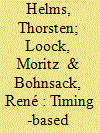| Srl | Item |
| 1 |
ID:
150892


|
|
|
|
|
| Summary/Abstract |
The traditional energy utility business model is under pressure, and energy services are expected to play an important role for the energy transition. Experts and scholars argue that utilities need to innovate their business models, and transform from commodity suppliers to service providers. The transition from a product-oriented, capital-intensive business model based on tangible assets, towards a service-oriented, expense-intensive business model based on intangible assets may present great managerial and organizational challenges. Little research exists about such transitions for capital-intensive commodity providers, and particularly energy utilities, where the challenges to servitize are expected to be greatest. This qualitative paper explores the barriers to servitization within selected Swiss and German utility companies through a series of interviews with utility managers. One of them is ‘asset transformation’, the shift from tangible to intangible assets as major input factor for the value proposition, which is proposed as a driver for the complexity of business model transitions. Managers need to carefully manage those challenges, and find ways to operate both new service and established utility business models aside. Policy makers can support the transition of utilities through more favorable regulatory frameworks for energy services, and by supporting the exchange of knowledge in the industry.
|
|
|
|
|
|
|
|
|
|
|
|
|
|
|
|
| 2 |
ID:
150440


|
|
|
|
|
| Summary/Abstract |
Energy policies in many countries push for an increase in the generation of wind and solar power. Along these developments, the balance between supply and demand becomes more challenging as the generation of wind and solar power is volatile, and flexibility of supply and demand becomes valuable. As a consequence, companies in the electric power sector develop new business models that create flexibility through activities of timing supply and demand. Based on an extensive qualitative analysis of interviews and industry research in the energy industry, the paper at hand explores the role of timing-based business models in the power sector and sheds light on the mechanisms of flexibility creation through timing. In particular we distill four ideal-type business models of flexibility creation with timing and reveal how they can be classified along two dimensions, namely costs of multiplicity and intervention costs. We put forward that these business models offer ‘coupled services’, combining resource-centered and service-centered perspectives. This complementary character has important implications for energy policy.
|
|
|
|
|
|
|
|
|
|
|
|
|
|
|
|